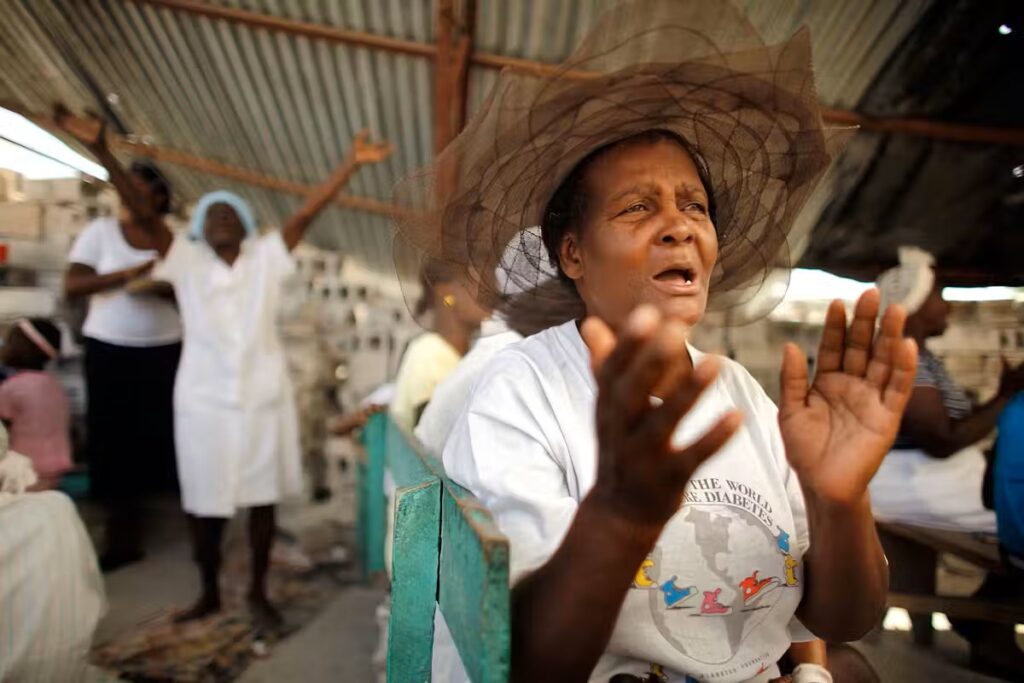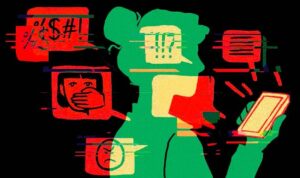How The Word ‘Voodoo’ Became A Racial Slur

An old woman prays in an earthquake-damaged church in the Ti Ayiti neighborhood on Feb. 23, 2010, in Cité Soleil, Haiti, after a Christian mob attacked a Haitian Vodou ceremony for earthquake victims (Chip Somodevilla/Getty Images)
For decades, it has been common for people to throw around terms like “voodoo politics,” “voodoo economics,” “voodoo science” and “voodoo medicine” to reference something that they think is ridiculous, idiotic or fraudulent.
Horror movies and crime shows often tell stories about evil “voodoo doctors” who terrorize their victims with black magic. Even Disney’s first movie with a Black princess, released in 2009, had a “voodoo doctor” as the villain.
Unfortunately, these shows and movies promote myths about voodoo that reinforce more than a century of stereotypes and discrimination. In my 2023 book, “Voodoo: The History of a Racial Slur,” I argue that voodoo is an extremely problematic term with a deeply racist history.
Most African diaspora religions, which are religions that have roots in Africa, have been mislabeled as voodoo at some point in time. This is especially true of Haitian Vodou – the religion that is most frequently stereotyped by outsiders as “voodoo” in the 21st century.
Early Uses Of The Term
The term voodoo traces its roots back to a word in the Fon language in West Africa that means “spirit” or “deity.” The French adopted a version of this term, “vaudou” or “vaudoux,” to refer to African spiritual practices in their colonies in Louisiana and Saint-Domingue – modern-day Haiti.
Later, “vaudou” evolved into “voodoo” in the English-speaking world. It first became a household term in the U.S. in the 1860s and 1870s. When the U.S. public was first introduced to voodoo, it was typically in newspaper articles and other publications that described African American spiritual practices in an exaggerated way, often retelling bizarre or even fabricated stories as if they were common practice.
Most of the time, the authors used these narratives about voodoo to argue that African Americans were unfit for citizenship, voting rights and holding public office because of their so-called superstitions.
In fact, the first time the term was widely used was after the Union forces seized New Orleans during the U.S. Civil War. Confederate supporters argued that the popularity of voodoo in Union-controlled New Orleans showed the barbarity that Africans would return to if not under the control of white people.
Later, in the 20th century, claims about voodoo were used as one way to justify the U.S. colonization of Caribbean countries with large Black populations. In particular, fabricated claims that Black Cubans were practicing the ritual murder of children as part of their voodoo practices circulated in the media to support sending forces to the island in the 1900s and 1910s.
Similarly, in the early 20th century, journalists, travelers and others falsely claimed that U.S. intervention was necessary because Haitians were engaging in cannibalism, human sacrifice and snake worship as part of their voodoo rituals. Historian Kate Ramsey writes in her 2011 book, “The Spirits and the Law: Vodou and Power in Haiti,” that while U.S. Marines were occupying Haiti from 1915 to 1934, they persecuted and prosecuted devotees – arresting the people they found participating in ceremonies and burning their sacred objects.
Meanwhile, in the first half of the 20th century, references to voodoo continued to be a way to speak disparagingly about Black populations in the U.S. Even the founders of the Nation of Islam were stereotyped as a “voodoo cult” after an alleged member committed a highly publicized murder in 1932.
Allegations that Black Muslims practiced human sacrifice followed the group for decades, long after the person who committed the crime was determined to be legally insane and sent to an asylum.
Prejudices Linger
This history has left a stain on public perceptions of voodoo that is difficult to wash away. The best example is the treatment of devotees of Vodou, a religion in Haiti that can trace many of its beliefs and practices back to West and Central Africa. Vodou centers on honoring the ancestors and venerating spirits known as the Lwa.
Vodou was frequently labeled as “voodoo” in Anglophone newspapers and other literature in the late 19th and early 20th centuries, and devotees were falsely accused of committing atrocities like cannibalism and human sacrifice during their ceremonies. Although Vodou has no ultimate source of evil in its cosmology, it is often denounced as devil worship. These myths have led to discrimination and violence against devotees.
In 2010, some Haitians and some foreigners blamed Vodou, which they often misspelled as “voodoo,” for the tragic earthquake and subsequent cholera outbreak that devastated Haiti. The most famous remarks came from the late Pat Robertson, an Evangelical minister and political commentator, who claimed that the earthquake was God’s retribution against Haitians for holding a Vodou ceremony. He described the Vodou ceremony as a pact with the devil to assist in their revolution against the French.
Within Haiti, some people committed acts of violence against devotees and denied them the emergency aid that was sent to quake victims. Later that year, violence escalated as some Haitians blamed Vodou for the cholera outbreak. In November and December of 2010, lynch mobs violently killed dozens of Haitian Vodou priests.
Unfortunately, discrimination and the violence perpetrated against Haitian Vodou and other African diaspora religious groups often goes unpunished and unnoticed. In fact, a recent survey suggests that a large portion of the U.S. public subscribes to the stereotypes about voodoo that led to these attacks.
With support from the Public Religion Research Institute, my fellow researchers and I asked 1,000 adults living in the U.S. whether they used the term “voodoo.” Two in 10 respondents, or about 20%, said they had used or heard others use the term at least once a month. The survey found fewer than 1 in 4 considered voodoo to be a religion.
Further, approximately 3 in 10 respondents believed that followers of voodoo were more likely to be involved in criminal activity than the average person, and an astonishing 64% said they believed that followers of voodoo were more likely to practice black magic or witchcraft than the average person.
This survey shows the pervasiveness of these biases that developed to support slavery and imperialism. Therefore, I argue that when someone makes a statement like, “That just sounds like some ‘voodoo’ to me!” they are co-signing the long racist history of the term and promoting the idea that religions from Africa are primitive, evil and barbaric.
(Published under Creative Commons from The Conversation. Read the original article here)





